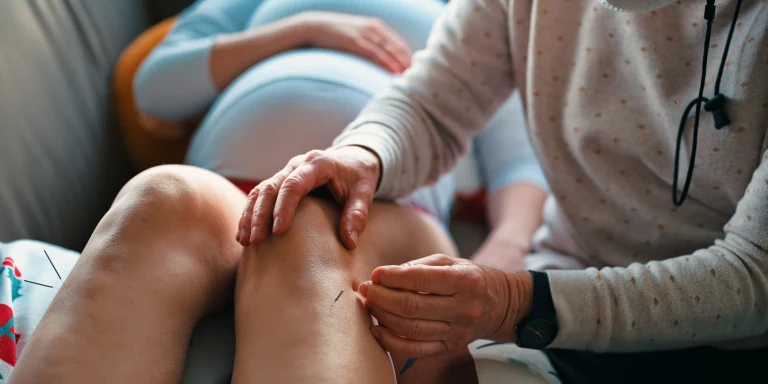Acupuncture during pregnancy
Acupuncture can serve as a practical supplementary treatment during pregnancy and can help with a number of symptoms. Find out about its many uses and benefit from the manifold advantages of this treatment.

What does acupuncture during pregnancy involve?
Acupuncture originally hails from traditional Chinese medicine, TCM for short. It is known to alleviate different types of symptoms without resorting to medication. Acupuncture during pregnancy is a treatment method that can provide support during this phase.
With acupuncture, practitioners insert thin needles into specific points on your body to promote the healing process in a natural way. For instance, acupuncture during pregnancy can be used to counter common complaints. Don’t fancy the needles? Then laser and ear acupuncture are good alternatives. With the latter, small beads or seeds are placed on the ear’s acupuncture points.
How much does acupuncture during pregnancy cost?
The cost of acupuncture during pregnancy depends on the practitioner, the region and the number of sessions.
Is acupuncture during pregnancy covered by health insurance?
Acupuncture can have a positive effect on common pregnancy complaints. Basic insurance covers 180 minutes of treatment every six months where the doctor has further training (FMH Swiss Medical Association license to practice) in acupuncture.
If you require further outpatient treatment or if your specialist is recognised by Helsana, this will be covered by supplementary insurance. Under SANA and COMPLETA supplementary insurance, you will receive 75% of the costs of medically necessary acupuncture. In addition to the benefits provided under COMPLETA, we cover 15% of the invoice amount, up to a maximum of CHF 500 per calendar year, under COMPLETA PLUS.
If the acupuncture is performed by a midwife, the costs will only be covered where this is performed in preparation for birth and provided one of the supplementary insurance products SANA, COMPLETA or COMPLETA PLUS is in place.
Important: we do not cover the costs of preventive treatments.
How can acupuncture help during pregnancy?
Acupuncture can be used to help you get pregnant. What’s more, acupuncture during pregnancy offers a range of benefits that can make your pregnancy more pleasant. These include:
Acupuncture for morning sickness
Acupuncture during pregnancy can alleviate typical morning sickness, thereby improving overall well-being.
Acupuncture for back pain during pregnancy
Pregnancy-related back pain is not uncommon. Acupuncture during pregnancy can help with pelvic pain (including pubic bone and pubic joint) and back pain.
Acupuncture for carpal tunnel syndrome during pregnancy
During pregnancy, the body tends to store more water. This is noticeable not only in swollen legs, but can also lead to a narrowing of the carpal tunnel in the wrist. Carpal tunnel syndrome is when the median nerve is compressed in the wrist. This nerve runs through a channel in the wrist called the carpal tunnel. The consequences are pain and numbness in the wrist. Acupuncture can be supportive as the treatment aims to relieve the pain and reduce swelling.
Acupuncture for haemorrhoids during pregnancy
Owing to the increased pressure in the abdomen, haemorrhoids are a common problem in pregnancy. Acupuncture can regulate blood flow and reduce pain.
Acupuncture for water retention during pregnancy
Acupuncture can help with water retention during pregnancy by stimulating specific points on the body to harmonise the flow of energy and fluid balance.
Acupuncture for migraines during pregnancy
Acupuncture can reduce the frequency and intensity of migraine attacks.
Acupuncture for heartburn during pregnancy
Many women suffer from heartburn, especially in the last trimester of pregnancy. Acupuncture stimulates the relevant points, which can help alleviate the symptoms.
Acupuncture in preparation for birth
Acupuncture can help your body to prepare for childbirth. Since acupuncture can also induce labour, it is very important that this treatment is carried out at the right time.
Acupuncture and mental health during pregnancy
Acupuncture during pregnancy can also have a positive impact on your mental health. Pregnancies can sometimes be stressful – making phases of relaxation all the more important. Acupuncture can have a calming effect and prevent mood swings. Likewise, acupuncture during pregnancy can also improve sleep.
How does acupuncture during pregnancy work and where are the needles placed?
With acupuncture during pregnancy, some acupuncture points are particularly effective when it comes to alleviating unpleasant symptoms. For instance, there are points on the back and the legs that can help with back problems and points of the wrist that have a positive effect on nausea. The precision placement of the needles is an art in itself. So when trying to find a complementary therapist, you should ensure that they have extensive expertise and adequate experience.
During pregnancy, acupuncture was originally intended to regulate the natural flow of energy in the body, known as Qi. In TCM, it is believed that Qi influences various organs and bodily functions, as well as emotions. In science, there are various theories about the effect of acupuncture: some researchers assume that the pinpricks stimulate the release of endorphins and other messenger substances that have an analgesic and relaxing effect. Another assumption is that the stimulation of acupuncture points promotes blood circulation and affects the nervous system. This, in turn, can provide relaxation.
Are there any risks associated with acupuncture during pregnancy?
When it comes to acupuncture during pregnancy, your safety and that of your baby comes first. Therefore, it is imperative that you only have acupuncture performed by experienced practitioners. Improper use of acupuncture during pregnancy can lead to side effects such as pain, bruising or infection at the puncture sites. Another risk is the induction of premature labour or miscarriage. If you are interested in acupuncture during pregnancy, it is essential that you clarify with the appropriate specialist whether or not such treatment is suitable for you.
Where can I get more information about acupuncture during pregnancy?
For more detailed information on acupuncture during pregnancy, it is best to take advantage of a comprehensive health consultation. Your midwife and gynaecologist can also give you important information about this treatment. You also have the option of seeking out an acupuncturist who specialises in acupuncture during pregnancy and for birth preparation directly.
Articles about this topic
Do you have questions?
We're here to help.

